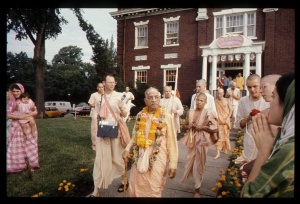SB 1.19.1: Difference between revisions
m (1 revision(s)) |
No edit summary |
||
| Line 1: | Line 1: | ||
{{info | {{info | ||
|speaker= | |speaker=Sūta Gosvāmī | ||
|listener=Sages of | |listener=Sages of Naimiṣāraṇya | ||
}} | }} | ||
[[Category:Srimad-Bhagavatam - Canto 01 Chapter 19|S01]] | |||
[[Category:Bhagavatam Verses Spoken by Suta Gosvami - Vanisource|011901]] | |||
<div style="float:left">'''[[Srimad-Bhagavatam]] - [[SB 1|First Canto]] - [[SB 1.19: The Appearance of Sukadeva Gosvami|Chapter 19: The Appearance of Śukadeva Gosvāmī]]'''</div> | |||
<div style="float:right">[[File:Go-previous.png|link=SB 1.18.50]] '''[[SB 1.18.50]] - [[SB 1.19.2]]''' [[File:Go-next.png|link=SB 1.19.2]]</div> | |||
{{CompareVersions|SB|1.19.1|SB 1965|SB 1972-77}} | |||
{{RandomImage}} | |||
==== TEXT 1 ==== | ==== TEXT 1 ==== | ||
<div class="verse"> | |||
<div | :sūta uvāca | ||
sūta uvāca | :mahī-patis tv atha tat-karma garhyaṁ | ||
mahī-patis tv atha tat-karma garhyaṁ | :vicintayann ātma-kṛtaṁ sudurmanāḥ | ||
vicintayann ātma-kṛtaṁ sudurmanāḥ | :aho mayā nīcam anārya-vat kṛtaṁ | ||
aho mayā nīcam anārya-vat kṛtaṁ | :nirāgasi brahmaṇi gūḍha-tejasi | ||
nirāgasi brahmaṇi gūḍha-tejasi | |||
</div> | </div> | ||
| Line 19: | Line 24: | ||
==== SYNONYMS ==== | ==== SYNONYMS ==== | ||
<div class="synonyms"> | |||
<div | ''sūtaḥ uvāca''—Sūta Gosvāmī said; ''mahī-patiḥ''—the King; ''tu''—but; ''atha''—thus (while coming back home); ''tat''—that; ''karma''—act; ''garhyam''—abominable; ''vicintayan''—thus thinking; ''ātma-kṛtam''—done by himself; ''su-durmanāḥ''—very much depressed; ''aho''—alas; ''mayā''—by me; ''nīcam''—heinous; ''anārya''—uncivilized; ''vat''—like; ''kṛtam''—done; ''nirāgasi''—unto one who is faultless; ''brahmaṇi''—unto a ''brāhmaṇa''; ''gūḍha''—grave; ''tejasi''—unto the powerful. | ||
sūtaḥ | |||
</div> | </div> | ||
| Line 27: | Line 31: | ||
==== TRANSLATION ==== | ==== TRANSLATION ==== | ||
<div class="translation"> | |||
<div | |||
Śrī Sūta Gosvāmī said: While returning home, the King [Mahārāja Parīkṣit] felt that the act he had committed against the faultless and powerful brāhmaṇa was heinous and uncivilized. Consequently he was distressed. | Śrī Sūta Gosvāmī said: While returning home, the King [Mahārāja Parīkṣit] felt that the act he had committed against the faultless and powerful brāhmaṇa was heinous and uncivilized. Consequently he was distressed. | ||
</div> | </div> | ||
| Line 35: | Line 38: | ||
==== PURPORT ==== | ==== PURPORT ==== | ||
<div class="purport"> | |||
The pious King regretted his accidental improper treatment of the powerful ''brāhmaṇa'', who was faultless. Such repentance is natural for a good man like the King, and such repentance delivers a devotee from all kinds of sins accidentally committed. The devotees are naturally faultless. Accidental sins committed by a devotee are sincerely regretted, and by the grace of the Lord all sins unwillingly committed by a devotee are burnt in the fire of repentance. | |||
</div> | |||
<div | |||
<div style="float:right; clear:both;">[[File:Go-previous.png|link=SB 1.18.50]] '''[[SB 1.18.50]] - [[SB 1.19.2]]''' [[File:Go-next.png|link=SB 1.19.2]]</div> | |||
</div> | __NOTOC__ | ||
__NOTOC__ | __NOEDITSECTION__ | ||
Revision as of 03:44, 3 May 2021

A.C. Bhaktivedanta Swami Prabhupada
TEXT 1
- sūta uvāca
- mahī-patis tv atha tat-karma garhyaṁ
- vicintayann ātma-kṛtaṁ sudurmanāḥ
- aho mayā nīcam anārya-vat kṛtaṁ
- nirāgasi brahmaṇi gūḍha-tejasi
SYNONYMS
sūtaḥ uvāca—Sūta Gosvāmī said; mahī-patiḥ—the King; tu—but; atha—thus (while coming back home); tat—that; karma—act; garhyam—abominable; vicintayan—thus thinking; ātma-kṛtam—done by himself; su-durmanāḥ—very much depressed; aho—alas; mayā—by me; nīcam—heinous; anārya—uncivilized; vat—like; kṛtam—done; nirāgasi—unto one who is faultless; brahmaṇi—unto a brāhmaṇa; gūḍha—grave; tejasi—unto the powerful.
TRANSLATION
Śrī Sūta Gosvāmī said: While returning home, the King [Mahārāja Parīkṣit] felt that the act he had committed against the faultless and powerful brāhmaṇa was heinous and uncivilized. Consequently he was distressed.
PURPORT
The pious King regretted his accidental improper treatment of the powerful brāhmaṇa, who was faultless. Such repentance is natural for a good man like the King, and such repentance delivers a devotee from all kinds of sins accidentally committed. The devotees are naturally faultless. Accidental sins committed by a devotee are sincerely regretted, and by the grace of the Lord all sins unwillingly committed by a devotee are burnt in the fire of repentance.